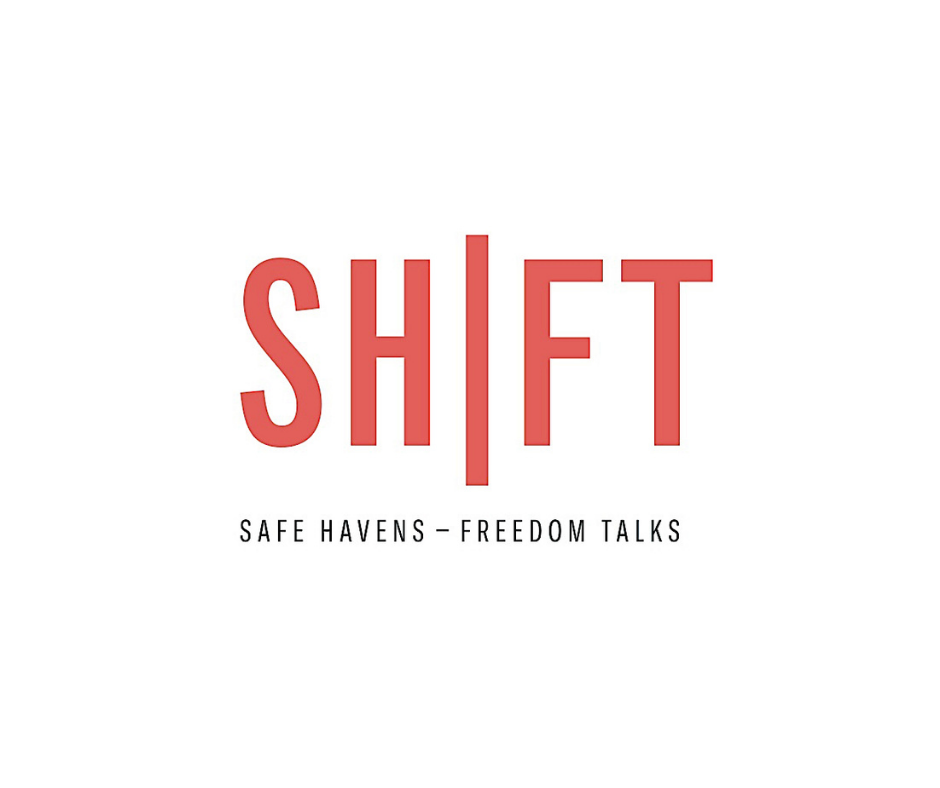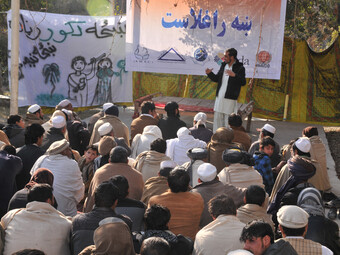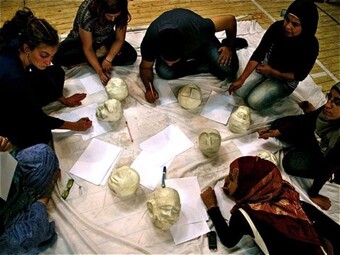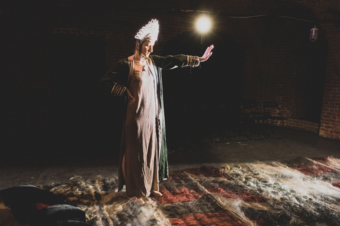Safe Havens Freedom Talks presented a conversation Destroying History: Urbicide and Destruction of Cultural Heritage in Bamiyan in Afghanistan livestreaming on the global, commons-based, peer produced HowlRound TV network at howlround.tv on Thursday 12 May 2022 at 8:30 a.m. EDT (New York, UTC -7) / 12:30 p.m. UTC / 2:30 p.m. CEST (Stockholm, UTC +2) / 5 p.m. AFT (Kabul, UTC +4:30).
Safe Havens Freedom Talks presents the third panel of the Buddha Nights series titled “Destroying History: Urbicide and Destruction of Cultural Heritage in Bamiyan”. In collaboration with Teater DOS and Buddha Nights, the event will be streamed on Thursday, 12 May 2022.
Moderated by Asad Buda (Afghan writer), Abdullah Mohammadi (researcher contributing to Mixed Migration Centre in Asia Region) and Dr Ali Karimi (Postdoctoral Fellow in the Annenberg School for Communication at the University of Pennsylvania) will look at the destruction of history and why what happened in Bamiyan is more than a case of violence against material heritage in this talk. In fact, it was a form of violence against the spirit of urbanity, civility, and a long history of cooperation and coexistence in Bamiyan.
In 2001, the Taliban shocked the world by blowing up two giant statues of Buddha in Bamiyan, Afghanistan. Violence is not new to Bamiyan. The valley of Bamiyan has documented its own history. When one enters the city, the first thing eyes see is the absence of Buddha statues at the side of a cliff. The empty niche shows not only the destruction of the statues but also the cultural genocide against the urban life that has been a part of the history of the valley. The destruction of Bamiyan Buddhas was one of the most horrific cultural crimes in recent memory.
About Buddha Nights
The destruction of the Bamiyan Buddha Statues in 2001 was beyond massacre. It was carried out in continuation of the ethnic cleansing, exclusively with the aim of destroying the history of the Hazara people. The purge even strongly has continued after the Taliban has returned on 15 August 2021.
In collaboration with Safe Havens Freedom Talks and Teater DOS, Buddha Nights arranges three discussions for seeking an alternative narrative related to what is happening in Afghanistan with a special focus on destroying world cultural heritage in Bamiyan. The objective of the project is to explore the social injustice and political inequality at the narrative level from different dimensions: Destroying History; Urbicide and Destruction of Cultural Heritage in Bamiyan, Injustice in Narrative; The Absent of Hazara People in International Narrative, and Intersectionality; Gender Discrimination in Afghanistan.
About Freedom Talks
Safe Havens – Freedom Talks series is closely connected to the annual global Safe Havens conference. The Freedom Talks series is focused on issues regarding threats towards artistic freedom, free press and intangible heritage. Guests in the Freedom Talks series are highly knowledgeable and prolific actors in the global Arts Rights Justice sector – fighting for artistic freedom. The Freedom Talks aim to share space and broaden the narrative of who can take centre stage, by lending the brand to different organisations within the sector. The talks are presented in – or translated to – English. The talks can be watched through our website, our Facebook page and through our partner Howlround, where also previous events are archived.
The Participants @Buddha Nights
Abdullah Mohammadi is a researcher contributing to Mixed Migration Centre in Asia Region. His main research interests are migration culture and forced displacement among Afghans. Beside his research, he has translated many books on Afghanistan society and politics (e.g., Dynastic Art of the Kushans, Art in Afghanistan: Objects from the Kabul Museum, and Afghanistan: A Cultural and Political History). Abdullah holds a master’s degree in Demography from the University of Tehran and is studying Ethnic and Migration Studies in Linkoping University, Sweden.
Asad Buda is a freelance writer from Bamiyan, Afghanistan. He studied sociology in Tehran and theology in Qom and he has worked as a University Lecturer in Kabul. He is the former ICORN guest writer in Karlstad. After his arrival in Sweden, a chapter of his personal memoir ´´Det återvändande Ögat´´ was published in Värmland Writers Anthology. As the project manager, He worked with Riksteatern on the Little History Project which resulted in publishing a book under the title of Hoppets Territorium. Besides writing, he works with visual art, focusing on the demonization of political enemies and aesthetic aspects of extremists and political violence. He worked with Khadim Ali on different projects: The Evil Flower, Sharjah Biennial 2019, The Invisible Border, 2020, Future as An Unknown Enemy, Action Gallery – New York, 2020 - 2021, Sermon on The Mount, Institute of Modern art – Australia 2021. There Is No Other Home but This is under exhibit at Govett-Brewster Art Gallery, from 26th February – 26th June 2022.
Dr Ali Karimi is a Postdoctoral Fellow in the Annenberg School for Communication at the University of Pennsylvania. He studies the history and politics of technology with a focus on information and governance. He is especially interested in numerical information and the instruments we use to quantify, classify, and measure things. Ali holds a Ph.D. (2020) in communication studies from McGill University, a master’s degree in Communication from the University of Ottawa, and a bachelor's degree in Film Studies from Kabul University. His publications include four journal articles and many pieces for the popular press. Ali is currently working on his first book project that deals with the history of information in Afghanistan.
Monirah Hashemi co-founded Simorgh Film Association of Culture and Art in Herat, in 2005. In 2006 she established a theatre department within SFACA where she worked as playwright, director and actor. Her award-winning debut play, Cry of History, which was produced solely by women was the first play performed before a mixed audience after Taliban’s collapse, at The Educational Theatre Festival in Herat, 2006. She has written and directed several plays with a focus on creating female-led and female-fronted productions, addressing a range of social justice issues, particularly related to women’s rights. Monirah who has performed nationally and internationally participated at the 9th and 10th Women Playwright International Conference with Masks Under the Burka and Sitaraha – The Stars in Stockholm and Cape Town in 2012 and 2015. Monirah Hashemi is a co-founder of A Night with Buddha Festival. Her latest play, Who Lights the Stars, depict the structural silence on incest.
*The event is organised by the independent international NGO Safe Havens Freedom Talks (SH|FT), through collaborations within the global Arts Rights Justice sector, and with Safemuse graciously supporting as its mentoring organisation in the start-up period. SH|FT is supported by The Swedish Arts Council under the Programme for Artistic Freedom funded by Sida, the Swedish International Development Cooperation Agency, and The Freedom Talks are sponsored by the Swedish Institute. The exhibition and platform project is sponsored by the Swedish Postcode Foundation.








Comments
The article is just the start of the conversation—we want to know what you think about this subject, too! HowlRound is a space for knowledge-sharing, and we welcome spirited, thoughtful, and on-topic dialogue. Find our full comments policy here